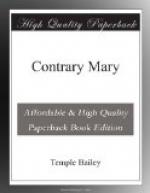“And do you think the old manners and morals will come?”
He shrugged. “Who knows? We can only hope.”
It was to Colin that Cousin Patty spoke confidingly of her admiration of Delilah. “She’s beautiful,” she said. “Mary says that you plan her dresses. I never thought that a man could do such things until Roger took such an interest.”
“Men of to-day take an interest,” Colin said. “Woman’s dress is one branch of art. It is worthy of a man’s best powers because it adds to the beauty of the world.”
“That’s the funny part of it,” Cousin Patty ventured; “women are taking up men’s work, and men are taking up women’s—it is all topsy turvy.”
The little artist pondered. “Perhaps in the end they’ll understand each other better.”
“Do you think they will?”
“Yes. The woman who does a man’s work learns to know what fighting means. The man who makes a study of feminine things begins to see back of what has seemed mere frivolity and love of admiration a desire for harmony and beauty, and self-expression. Some day women will come back to simplicity and to the home, because they will have learned things from men and will have taught things to men, and by mutual understanding each will choose the best.”
Cousin Patty was inspired by the thought. “I never heard any one put it that way before.”
“Perhaps not—but I have seen much of the world—and of men—and of women.”
“Yet all women are not alike.”
“No.” His eyes swept the table. “You three—Miss Ballard, Miss Jeliffe—how far apart—yet you’re all women—all, I may say, awakened women—refusing to follow the straight and narrow path of the old ideal. Isn’t it so?”
“Yes. I’m in business—none of our women has ever been in business. Mary won’t marry for a home—yet all of her women have, consciously or unconsciously, married for a home. And Miss Jeliffe I don’t know well enough to judge. But I fancy she’ll blaze a way for herself.”
His eyes rested on Delilah. “She has blazed a way,” he said, slowly; “she’s a most remarkable woman.”
Delilah, looking up, caught his glance and smiled.
“Are they in love with each other?” Cousin Patty asked Mary that night.
Mary laughed. “Delilah’s a will-o’-the-wisp; who knows?”
With their days filled, there was little time for intimacy or confidential talks between Mary and Cousin Patty. And since Mary would not ask questions about Roger, and since Cousin Patty seemed to have certain reserves in his direction, it was only meager information which trickled out; and with this Mary was forced to be content.
Grace marched in the Suffrage Parade, and they applauded her from their seats on the Treasury stand. Aunt Frances, who sat with them, was filled with indignation.
“To think that my daughter——”
Cousin Patty threw down the gauntlet: “Why not your daughter, Mrs. Clendenning?”




